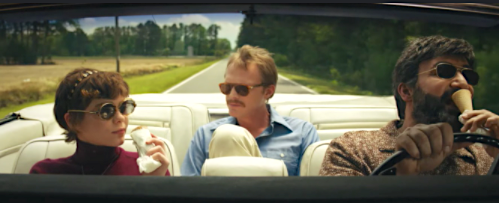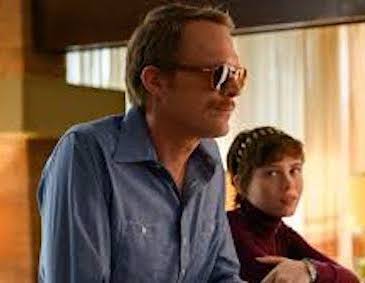
Everybody wants a happy ending. Especially with gay-themed movies, we’re so used to seeing LGBTQ+ characters go through trauma, abuse or end up killed by the time the credits roll. It’s always nice when movies about the queer experience can be positive or uplifting. However, they also have to be genuine. Uncle Frank wears its heart on its sleeve, and that works for a while. Yet, as the movie goes on, it becomes so sweet and saccharine, you just wind up with a toothache.
 It’s 1969, Elizabeth Bledsoe (Sophia Lillis) doesn’t fit in with her South Carolina family. Her parents (Steve Zahn and Judy Greer) fade to the background in traditional gendered roles. Meanwhile, her Grandpa, Daddy Mac (Stephen Root), spews orders and hate at every turn, while Mammaw (Margo Martindale) and Aunt Butch (Lois Smith) gab in the kitchen. She feels the greatest kinship with her Uncle Frank (Paul Bettany), who seldom comes down from New York...
It’s 1969, Elizabeth Bledsoe (Sophia Lillis) doesn’t fit in with her South Carolina family. Her parents (Steve Zahn and Judy Greer) fade to the background in traditional gendered roles. Meanwhile, her Grandpa, Daddy Mac (Stephen Root), spews orders and hate at every turn, while Mammaw (Margo Martindale) and Aunt Butch (Lois Smith) gab in the kitchen. She feels the greatest kinship with her Uncle Frank (Paul Bettany), who seldom comes down from New York...
When he does, he always talks to her about literature and school, at least when he’s not being bullied by Daddy Mac. Both Lillis and Bettany do a great job initially at establishing the bond between Elizabeth and Frank. The performances from these actors are the best parts of the film, particularly in the first act.
Elizabeth gets into NYU, where Frank teaches, and uses this as an opportunity to get closer to her favorite uncle. When she pops by his apartment one evening, she’s greeted by Wally (Peter Macdissi), Frank’s “roommate.” They also just so happen to be having a party filled exclusively with gay men. Frank finally comes out to Elizabeth, who readily accepts him. However, both Bledsoe outcasts soon get called home when Daddy Mac dies unexpectedly. Both Elizabeth and Wally want Frank to use this time to come out to his remaining family members. However, Frank has other demons he must confront in coming home.

Any time the movie works, it’s because of the skilled performances. Paul Bettany does a great job establishing Frank as a weary black sheep of the family. There’s a great disparity between the effortless confidence he exhibits in New York versus the stiff, uncomfortable punching bag in South Carolina. As the plot takes Frank further down a path of self-loathing, the character becomes harder to track. Yet, Bettany always remains watchable. The same could be said about Sophia Lillis. She’s already proven to be a winning young talent in projects like It Chapter 1 and 2. Here, she gives Elizabeth sweetness and gumption to establish the character as our narrator. Unfortunately, her character recedes into the background in the second half, as she’s left to just watch the plot fold out in front of her.
Unfortunately, most of the star-studded ensemble is wasted. Greer, Zahn, Martindale and Smith all add laughs and texture to the Bledsoe family. Yet, they don’t get many defining characteristics of their own. Stephen Root is the only extended Bledsoe family member to get meaningfully differentiated. However, his mean, homophobic Father often comes off more cartoon-y than menacing. He’s just a ball of hate who spews vitriol at every moment, not allowing any moment of complexity or nuance.

Though it's a period piece, Uncle Frank distinctly feels like it was written in the present. That’s not meant to be a compliment. If it weren’t for constant dialogue nods to the era, one would think this was set in a more recent time. On one hand, this illustrates how the costume and production design lack specificity. More damning, it signals the lack of a clear directorial vision. The sun-drenched, yet sterile, yellow coloring would have even Steven Soderbergh saying “enough.” Scenes lack rhythm. They will either jolt forward or law static for much longer than they should. As a director, Alan Ball doesn’t seem to know what he’s going for.
Alan Ball has done incredible work in the past as a writer. American Beauty hasn’t aged well for many reasons, but he does possess a really strong, biting voice in his skewering of suburbia. While True Blood may have been uneven throughout the years, at its best it was a sexy, campy and dirty thriller with themes of love, self-acceptance and standing up for those being other-ed. With Uncle Frank, Ball has lost his edge, but maintained his tendency to go broad. There’s potential to make this campier. The movie has both Margo Martindale and Lois Smith,.for crying out loud. Instead, his script feels unspecific and cliched. We’ve seen this queer narrative before and slapping an extra smile or a few “it gets better” type mantras doesn’t make it fresh.
 The conclusion of the piece wraps everything up in a nice tidy bow. Rather than dissect the prickliness and bigotry of the Bledsoe family. Alan Ball seems so desperate for a happy end, he’ll do anything to make it happen. The movie wants the hearts of the audience to soar. Yet, everything winds up feeling a bit hollow and manufactured by the end. C
The conclusion of the piece wraps everything up in a nice tidy bow. Rather than dissect the prickliness and bigotry of the Bledsoe family. Alan Ball seems so desperate for a happy end, he’ll do anything to make it happen. The movie wants the hearts of the audience to soar. Yet, everything winds up feeling a bit hollow and manufactured by the end. C
Uncle Frank was screened at AFI Fest 2020. It is now available to stream on Amazon Prime.